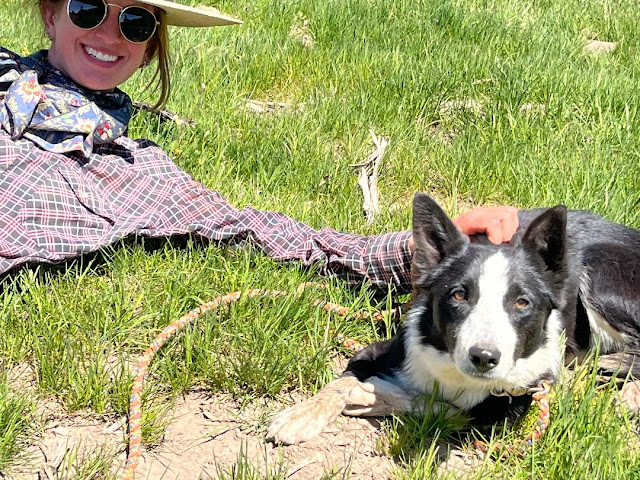There are 4 bull
elk standing in view out my office window, another 100 head top the sandhill
just across the horse pasture. The horses are interested, not alarmed; they’re becoming accustomed to their wild companions. The elk have been here on our
valley ranch for weeks now. They were fun at first, such majestic animals, but
the fun has worn off. They’re a constant fencing job and are eating forage we
had saved for the cows. When I walk the dogs, I encounter elk poop and hoof
prints in the snow in every direction.
The elk herd
gracefully clears our fences if they move calmly. But if a car appears or we
startle them at all, they get scared and speed up until they aren’t jumping
anymore. They get closer and closer to the ground, downing wires and breaking
posts. It’s an economic burden to feed them and a labor drain to repair the
fences.
We like the thought of leaving standing feed, “stockpiling grass” as it’s called. We harvested hay or grazed the pastures once last summer and let it regrow since August. The cows eat the forage eventually as winter plays out, and in the meantime, the plant cover protects the soil and the organisms that live below and above ground. Not this year though, the elk have taken a lot.
My friend Jack,
a retired sage grouse biologist, bemoans the loss of cover for game birds in
the lowlands where elk are wintering. In our region this means pheasants, turkeys, partridges, quail and grouse, which we all enjoy seeing. It’s never just one
thing is it?
We’ve been working with Fish and Game to harvest some animals by giving depredation tags to a few neighbors. When those were spent, we acquired additional "kill permits" to harvest more elk. We’re happy to see folks filling their freezers with delicious and nutritious meat. It hardly seems a drop in the bucket though, and it doesn’t seem to bother the herd enough to get them to go back across the river to range ground. Hunting means more fence wrecking too, so we can't decide if it's good or bad.
They were getting
a good bite into the haystack when Mark put a stop to it by stacking big straw
bales, three high, all around the stackyard. Thankfully we had the straw on
hand. It’s quite a fortress now. Anna said a funny the next morning when she
imagined the herd with picket signs surrounding ranch headquarters: “Down
with ranchers, elk have rights!”
We're good with
having elk around on the occasional severe winter, but if this is the new
normal, it's a real concern. What set of circumstances changed
their numbers and behavior? They're opportunistic grazers and have discovered
easy pickings on farm and ranch ground in the valley. Does winter recreation
traffic have any effect? What about predators? And if they’re
like domestic livestock, a higher plane of nutrition means a
higher reproductive rate, only adding to the problem.
We humans like
to think we're in charge. It’s all about us. But as we’re learning with water - the availability and reliability of the supply - we are truly at nature’s
mercy. And mercy is not in nature’s dictionary. It is pure cause and effect.
The elk herd is just one example of this grand truth.
 |
| They look right at home, don't they? |




















.jpg)
